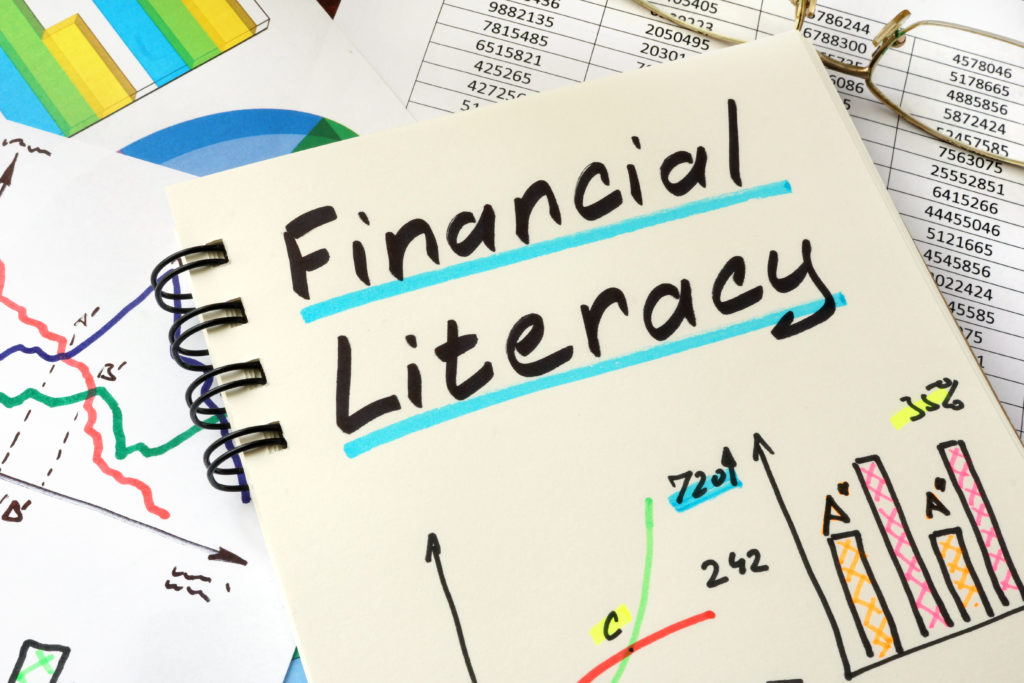
If you don’t know how to spend, invest, and save money correctly, it can really take a toll on you. Bad money habits are often created early on in life and are usually learned from our parents. But there’s good news! It’s easier than you think to unlearn these habits, with a few helpful tips and some practice. Financial literacy is an important skill that can transform your life. So, in this guide, we’ll explore what financial literacy is, why it matters, and how you can improve yours.
What Is Financially Literacy?
Before we get started, let’s first make sure you understand what this concept is. Financial literacy is about having a strong understanding of basic financial concepts. These could include personal financial management, budgeting, and investing. With these basics under your belt, the goal is for you to make informed decisions with your income. But it’s also about knowing how money works, how to manage it, and how to grow it.
These are all skills you should have, especially with the current state of our economy. According to a 2023 survey by Payroll.org, 78% of Americans are living paycheck to paycheck.* That’s over three quarters of the nation! Because many live paycheck to paycheck, most Americans can’t afford to save money for their future. This also means that debt is a common issue in many households.
Why Financial Literacy Matters
Financial literacy is an important life skill for several reasons.
Knowledge is Power
For starters, knowledge is power, especially when it comes to managing your money. Being financially literate allows you to make informed decisions about your money. Whether you’re deciding on a mortgage, choosing between investment options, or planning for retirement, it’s important to understand how each choice can affect your finances.
Avoid Debt Traps
One of the biggest financial challenges Americans face is managing their debt. Without financial literacy, it can be easy to fall into debt traps. These could include high-interest credit cards or mortgage payments that are too high to afford. Financial literacy can teach you how to manage your debt, repay your debt, and avoid borrowing and spending more than what you can afford.
Build Your Wealth with Financial Literacy
Financial literacy can teach you to grow your money over time. This is because learning how to save and invest are key parts of financial literacy.
Preparing for the Future
Life is full of uncertainties, and it’s best to be prepared. Whether you’re dealing with an unexpected job loss, medical emergency, or something else, having a strong understanding of basic financial concepts can help. This could look like building an emergency fund or investing in insurance.
If you’re feeling overwhelmed, don’t worry! Financial literacy basics are easier to understand than you may think. Remember that while it’s important to understand best money practices, it only works to your benefit if you actually use them. So, let’s jump into the basics!
Financial Literacy Basics
You can take a deep dive into financial literacy and learn about investments, stocks, 529 plans, etc. Or you can start with the basics, like budgeting, saving, and investing.
Creating a Budget
Making a budget is usually a good place to start. However, sticking to that budget can be an entirely different story. With a budget in hand, you can get a better idea of how much money is coming in each month vs. how much is going out.
You’ll want to include all of your monthly expenses in your budget. For example, your mortgage or rent, utility bills, and credit card payments. You’ll also want to make sure to budget for groceries and any entertainment expenses. It’s important that while you’re tracking all of your monthly expenses, you do your best not to overspend.

Pay Off Your Debt
We know paying off debt isn’t easy and requires a great deal of sacrifice. For example, you may need to start eating out less. Choose to spend a night at home rather than spending money on a night out with friends. While it may be hard at first, these sacrifices could quite literally pay off in the end.
According to the Federal Reserve Bank of New York, the total consumer debt in the United States is $17 trillion+, and currently at a record high.* With debt at an all-time high, paying it off is a priority for more people than ever. And since your time spent paying off debt directly impacts your ability to save and invest for your future, it’s pretty important.
Check out our guide on debt relief options for more helpful tips on this topic.
Open a Savings Account
If you have any money left in your budget, you might want to consider putting it into a savings account. If you think you don’t have enough money in the bank to start a savings account, think again. Even small contributions can add up over time. To maximize your savings, ask your bank if they’re currently offering any bank account bonuses. You can also look into high-yield savings accounts for higher earnings.*
Having a dedicated savings account may eliminate some of the temptations you might face if you were to keep those extra funds in your checking account. Set a short-term goal and a long-term goal for yourself. Before you know it, putting money into your savings can turn into a habit that can pay off for years to come.
Create an Emergency Fund
Financial experts recommend having at least 3-6 months’ worth of living expenses saved up. This is most helpful in case of a sudden job loss or other unforeseen circumstances. Emergency expenses are never fun and are made even more stressful if you aren’t financially prepared for them. So, consider starting your emergency fund today. This money can help if an unexpected medical bill pops up or if your car breaks down. And having that extra cushion can help give you peace of mind when you need it most.
Deeper Financial Dive
The above points are a great starting point. But as you become more financially literate, you can start to learn more complex concepts. These could include compound interest, interest rates, and investment options, including IRAs, 401(k), etc. Many Americans may not have a pension to fall back on in retirement. So, it’s up to you to secure your future and plan accordingly.
Educate Yourself on Financial Literacy
Where can you learn more about financial literacy? There are several free resources online that can teach you the basics or even more complicated concepts. Also, you can always check with your employer to see if they offer any financial wellness classes. Credit counseling may be another good option. Credit counselors can help you come up with a plan to pay off your debt and explain how interest rates affect you and your payments.
Wrapping Up Financial Literacy
Remember, it’s important to take baby steps in this process so you can fully grasp how your money comes in, is spent, and is eventually invested. Financial literacy can give you the confidence you need to make sound financial decisions.
*High-interest loans can be expensive and should be used only for short-term financial needs, not long-term solutions. Customers with credit difficulties should seek credit counseling. The opinions expressed above are solely the author’s views and may or may not reflect the opinions and beliefs of the website or its affiliates. Cash Factory USA does not provide financial advice.
This blog contains links to other third-party websites that are not endorsed by, directly affiliated with, or sponsored by Cash Factory USA. Such links are only for the convenience of the reader, user, or browser.